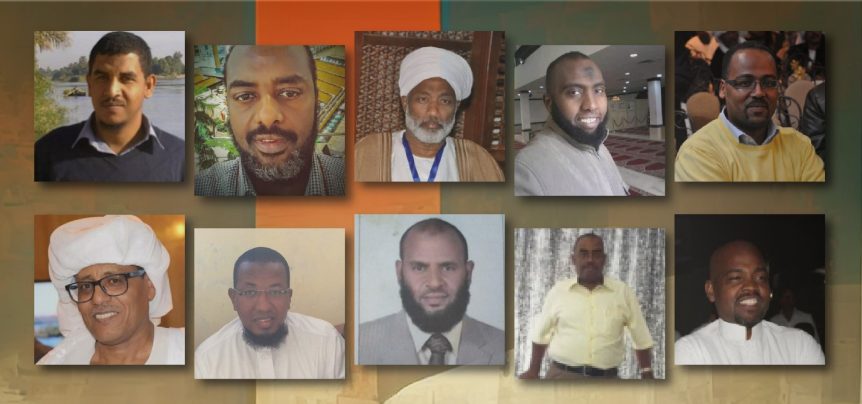The undersigned organizations condemn the unjust sentences issued on Monday, 10 October 2022, against ten Egyptian Nubians by the Specialized Criminal Court in Riyadh, Saudi Arabia. Sayed Hashem and Adel Fakir were sentenced to 16 years and 14 years in prison respectively, while the sentences against the remaining defendants ranged from 10 to 12 years in prison. Families of the detainees were unable to attend the hearing or receive information about the sentencing from the court.
The facts of the case go back to a symposium that the Nubian community planned to organize in Riyadh on 25 October 2019, to celebrate the most prominent Nubians who participated in the October 1973 war. The symposium announcement featured an image of Field Marshal Tantawi and sergeant major Ahmed Idris, and Nubian soldiers who fought in the war.
The ten Nubian Egyptians were arrested prior to the symposium and were forcibly disappeared and interrogated without a lawyer present. Investigations targeted their political views regarding the issue of the return of Nubians displaced from their homes between 1963 and 1964 during the construction of the Aswan High Dam. They were further interrogated about reason for using an image of Field Marshal Tantawi but not an image of Egyptian President Abdel Fattah El-Sisi.
From the beginning of the case until the present time, there has been an absence of intervention from the relevant Egyptian government bodies, such as the Ministry of Foreign Affairs, the Ministry of State for Immigration and Egyptians Abroad, and the Egyptian Consulate in Riyadh, despite the close relations between the leaders of the two countries.
Saudi authorities released six of the detainees on the same day, while the remaining four were held for varying periods of up to two months. During the period of detention, Dr. Farajallah Youssef, who suffers from diabetes, underwent several medical operations including an amputation of his foot due to his feet’s placement in cuffs. All detainees were re-arrested in July 2020, and disappeared for five months. It wasn’t until December 2020 that one of the detainees made the first contact with his family.
The detainees were tortured, as documented by a defense memorandum submitted in January at the beginning of this year. The prosecution objected, however, thus the defense was compelled by the court to amend its memorandum due to its inclusion of the term “torture.” Most of the detainees were not allowed to receive visitors and phone calls. Nor were they allowed to be alone with their lawyers or speak with their families without security oversight, which confirms the lack of fairness and integrity of the trial.
The signatories to this statement condemn the unjust trial and unjust verdicts stemming from a cultural symposium commemorating a national occasion. The signatories further call on the Egyptian government to fulfill its responsibilities set out in Article 88, of its constitution, which commit the government to “take care of the interests of Egyptians residing abroad, protect them and guarantee their rights and freedoms “. Thus, the Egyptian government is obligated to intervene immediately to ensure the release of the ten imprisoned Egyptian citizens in Saudi Arabia.
Signatories
- Refugees Platform in Egypt (RPE)
- The Egyptian Initiative for Personal Rights (EIPR)
- Egyptian Front for Human Rights
- El Nadim center
- Cairo Institute for Human Rights Studies (CIHRS)
- The Egyptian Commission for Rights and Freedoms (ECRF)
Share this Post

